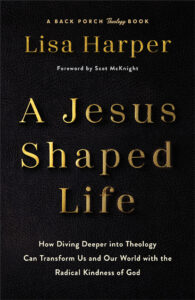How Theology Invites Us to Feel More Honestly
Discover how understanding the difference between formal and functional theology can transform your faith. Explore the practical power of theology in everyday life.

I’ve been teaching the Bible for many years, but I’m finally near the very end of my doctoral program at Denver seminary. Let me tell you, I’ve had so many aha moments there that I wish there was an emoji of a saucer-eyed middle-aged chick with the caption, “WOW!” In fact, I almost fell out of my seat on the first day of class when I learned the difference between formal theology and functional theology!
Two Theologies
Here’s the deal: Most Christians have two theologies. We have a “formal theology,” which could be loosely described as the statement of faith that hangs in our church foyer or is written on their website.
On the other hand, our “functional theology” is how we live our everyday lives when we’re not worshiping in church or a Christ-centered small group or attending a Christian concert or faith-based event. And the areas where they don’t overlap are seedbeds of hypocrisy. Because if what we believe to be true of God doesn’t change the shape of our heart and how we live our lives, then it’s simply a conceptual idea.
And that’s the part where I almost committed the very unladylike act of sliding out of my chair in the middle of class. Because knowledge—conceptual ideas or cognitive information—is a bunch of fig leaves I’ve often used to camouflage fear and shame.
Lament
Let’s start with the good news coming from the Psalms, but before we dive in, I should qualify that it might sound like bad news at first because it’s one of the saddest songs in the Psalter.
As the deer pants for streams of water, so my soul pants for you, my God. My soul thirsts for God, for the living God. When can I go and meet with God? (Ps. 42:1–2)
Since water is used as a metaphor for God’s grace throughout the Bible, I think it’s fitting that the Sons of Korah (the ancient worship leaders who wrote this sacred song) use thirst here at the beginning of their bluesy tune to underscore how only God can quench the parched heart of despair. But then the whole liquid theme starts running downhill straight to self-indulgent city:
My tears have been my food
day and night,
while people say to me all day long,
“Where is your God?”
These things I remember
as I pour out my soul:
how I used to go to the house of God
under the protection of the Mighty One
with shouts of joy and praise
among the festive throng. (vv. 3–4)
The Sons of Korah originated from the tribe of Levi and were given the task of leading worship through music, and these particular lyrics express melancholy nostalgia about their former glory.
Fortunately, these pensive hymn writers finally stop pining for the past and remember why they can hang on to hope. It’s as if they pinch themselves back to reality and exclaim, “Oh yeah! Now we remember how Yahweh said He would never leave or forsake us, no matter what!”
I say to God my Rock,
“Why have you forgotten me?
Why must I go about mourning,
oppressed by the enemy?”
My bones suffer mortal agony
as my foes taunt me,
saying to me all day long,
“Where is your God?”
Why, my soul, are you downcast?
Why so disturbed within me?
Put your hope in God,
for I will yet praise him,
my Savior and my God. (vv. 9–11, emphasis mine)
An Invitation to FEEL
What I appreciate most about psalms of lament like this is that God allowed them to be included in His hymnal in the first place.
Instead of disowning disillusioned people, God offers us the fifty-nine psalms of lament like an engraved invitation to express our sorrow. What a glorious relief that our Creator Redeemer doesn’t expect us to curate our emotions and only bring the ones before Him that are perfectly congruent with an ancient Christian creed or our church’s statement of faith.
Reflection:
What forms your formal theology vs your functional theology? Are there any areas where they differ or that you haven’t thought through and been honest with God about?
If you enjoyed this post, check out the book A Jesus-Shaped Life: How Diving Deeper into Theology Can Transform Us and Our World with the Radical Kindness of God by Lisa Harper. We love how she makes theology engaging, practical, and applicable by explaining how academic-sounding concepts are not rigid theoretical propositions but transformative realities that we get to live out with God and with other people.

Lisa Harper is an engaging communicator as well as an authentic and substantive Bible teacher in person, on TV, and on the radio. She holds a master of theological studies from Covenant Seminary and is in the final dissertation stage of an earned doctorate from Denver Seminary. She and Missy, her adopted daughter from Haiti, live on a hilly farmette south of Nashville, Tennessee, where they enjoy eating copious amounts of chips, queso, and guacamole. Connect with her online at LisaHarper.org.







